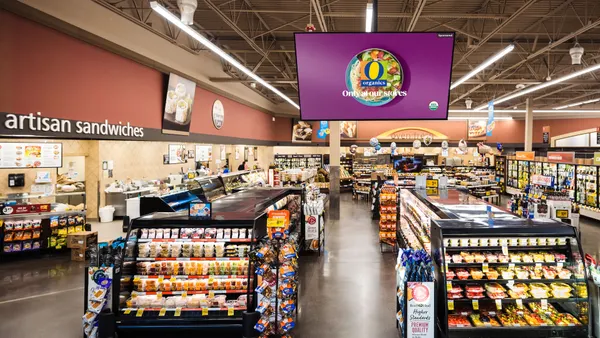Dive Brief:
- Facebook Messenger is evolving with several updates, in what's being called Messenger Platform 2.0, including the ability to assimilate services from various apps such as Spotify and OpenTable directly into the messaging platform via a feature called chat extentions, according to a report in Fortune on Facebook’s annual developer conference F8, which opened yesterday. The news was also announced on the Messenger blog.
- Explaining chat extensions, The Verge likened them to the iMessage App Store, albeit “with a nicer design.” They allow users to pursue activities beyond chatting — listening to music or booking a restaurant reservation, for instance — without exiting Messenger.
- Facebook has also rolled out a Discovery tab in Messenger that spotlights featured and trending chatbots, and contains a search bar to help identify new ones; automated suggestions from the AI-powered digital assistant M; and Messenger QR codes that can be scanned with the Messenger camera to connect users to branded chatbots.
Dive Insight:
Facebook Messenger chief David Marcus has acknowledged early chatbots weren’t that great. The AI-powered customer service agents have been criticized as being ineffective and disappointing to the consumers brands are trying to please with them. Even when they do provide a good service, chatbots have been hard to find. Bloomberg suggests “part of that was on purpose.” Marcus was giving chatbot creators time to better the programmed conversationalists, which currently total 100,000 on Messenger.
Now, Messenger is unmasking its chatbots to encourage bot-human interactions. The Discover tab within the chat platform will be a destination users understand they can go to in order to check out chatbots. It’s likely to expose them to bots — and, correspondingly, businesses — that they weren’t aware were available on Messenger. Additionally, Messenger’s digital assistant M will recommend chatbots to users amid conversations to let them know there might be a bot that can handle a service — like pizza delivery or ride sharing, for example — they might be interested in.
Along with the chat extensions that allow users to stay within Messenger if they want to hear music, among other pastimes, Messenger’s intent is to be “the centralized place for daily activities,” per Fortune. But Bloomberg points out that Facebook’s money-making goals for all the hanging out on Messenger aren’t clear. Marcus has stated advertising is a focus for Messenger’s business. Certainly, for marketers, Messenger is a compelling platform if its 1.2 billion users stick around on it for a range of tasks. And, if Facebook decides to chase additional revenue-producing ventures, it can’t hurt that Messenger is giving users more reasons to stay within its ecosystem.









